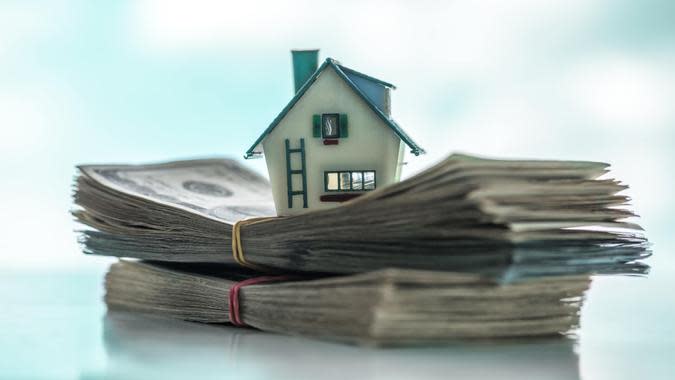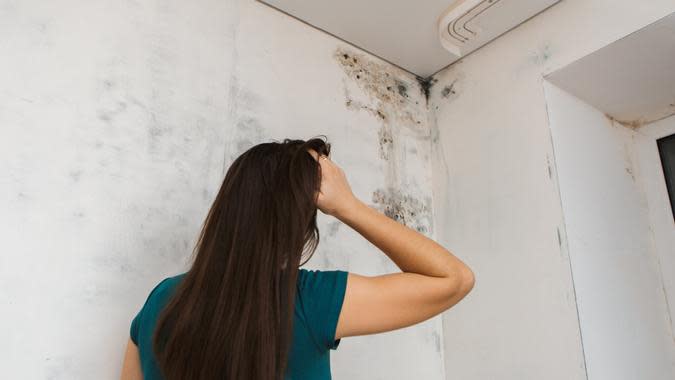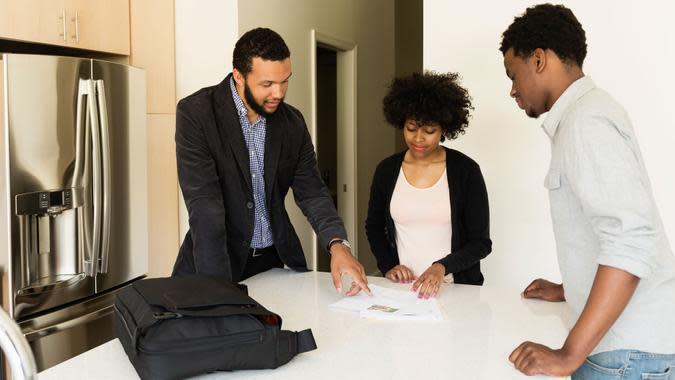Avoid a Flop With These 25 House-Flipping Tips

Today's red-hot real estate market has made house flipping more popular and profitable than it's ever been. The average profit on a flip is now $66,000 per home, according to Bloomberg. That kind of profit incentive -- along with HGTV making it look like anyone can do it -- has swelled the ranks of pros and wannabes alike to a point of market saturation.
But there's always room for one more ambitious investor with a few bucks and a vision.
Make the Right Moves: Home Renovations That Will Pay You Back
Check Out: Surprising Data Reveals The Top 25 Tax-Friendly States To Retire
If you're fixated on the dream of purchasing distressed houses, renovating them into dream homes and selling them for a profit, good luck. It's a very crowded and competitive field that requires a deep understanding of construction, real estate, finance and market analysis all at the same time.
Those are high barriers to entry, indeed. However, if you think you've got what it takes, consider the following before you get started.
Practice Makes Perfect: 5 Affordable Ways To Make Over Every Room in Your House

Have a Background in the Trades
There are two types of house flippers: those who can do a lot of the work themselves, and those who have to pay other people to do it for them. Veterans of the trades have the tools, knowledge and experience to identify problems, size up projects and predict what it will cost to handle them.
They also have a network of colleagues and connections to lean on for advice and support. Among those connections are reliable, trusted associates who they can hand-pick when it comes time to build a crew. If you didn't save up for your first flip by working in the trades, it's certain that some of your competitors did. Start by understanding that they have a huge advantage over you right out of the gate.
The Economy and Your Money: All You Need To Know

Consider Taking On a Partner in the Beginning
If you've never flipped a house, you're facing an enormous learning curve no matter your background. Consider bringing on a more experienced partner for your first go-around, particularly one who fills gaps in your knowledge set. If you know finance, for example, partner up with someone who knows construction.
Sure, you want all the glory and profit for yourself, but all it takes is a few rookie mistakes to rob you of both. The addition of an experienced partner can help you avoid those mistakes in the first place. Yes, you'll have to split the profits, but at least there will be profits to split. Consider it an investment in knowledge and a hedge against failure.
Read: 20 Ways To Pay Less at Costco

Join a Community
House flipping is just like anything else -- you'll do better with the support and combined knowledge of a like-minded community. Bigger Pockets is the largest and most popular online real estate investing community, although it does have competitors. It's free to join and offers optional subscription services that you can dabble in over time if you choose.
There's an entire ecosystem of podcasts, books, seminars, forums, meetups, social media, research materials and discussion boards. Whether you're looking for a flip partner with a background in remodeling or searching for answers to questions about capital gains taxes, a community like Bigger Pockets is a good place to call home base.
Discover: 22 Side Gigs That Can Make You Richer Than a Full-Time Job

Save Lots of Money -- the More, the Better
Plenty of experienced real estate investors -- including some of the Bigger Pockets crew -- have written books about how to invest in real estate and even flip houses without any cash.
Maybe those books are worth reading.
In reality, every flip comes with hidden obstacles and unforeseeable challenges that can only be solved by throwing money at the problem. Money puts out fires and keeps things moving on schedule. No matter how much you have saved, more is always better. The moment the money runs out, your flip dies.
Related: 30 Ways To Upgrade Your Home Without Blowing Your Budget

If You're Going To Borrow, Now Is the Time
Saving enough money to complete a flip is an option that is simply out of reach for most. The good news is, lenders are looking to cash in on the flipping craze, just like you. As of March, over 60 banks were lending to flippers, according to Bloomberg, which is an incredible increase of 50% in just two months. Rates are still low and lenders are eager, so financing a flip is certainly possible.
Modern Money Etiquette: Should You Pay a Friend Who Does You a Professional Favor?

Understand That Everyone Else Is Borrowing, Too
If you do borrow money, you should expect to pay double the annual rate of a 30-year mortgage -- 3.09% in March, on average, compared to 7.9% for a fix-and-flip loan. That's still low enough to make flips profitable, but cheap money is a double-edged sword. Bloomberg reports that the widespread availability of low-interest cash has flooded the market with new competition, particularly in the low-end of the market where most flipping takes place.
Economy Explained: Understanding Interest Rates -- How They Affect You and the US Market

Don't Underestimate How Much Time It Will Take
Most flips fail because the flipper runs out of cash, but running out of time can be just as fatal. The clock starts ticking the moment you buy a property. The longer you hold the property, the less likely it is that you'll ever turn a profit. Unless you're independently wealthy, you'll be working while you're flipping, which gets exhausting quickly. Although you don't see them now, your flip is littered with hidden flaws that seem designed by nature to drag out your timeline. The longer your flip drags out, the thinner your budget must be stretched. In the planning stages, treat time the same way you treat money -- calculate the maximum cost, then budget for more.
Budgeting 101: How To Create a Budget You Can Live With

Don't Overestimate Your Own Abilities
In house-flipping and in life, misplaced confidence can be dangerous. Maybe you own a home and you've proven to be handier than you thought. Maybe you installed your own crown molding. Maybe you even did a little plumbing just by watching a few YouTube videos.
But what about tracing a leak to vent flashing on the roof or doing HVAC repair?
On HGTV, they make it seem like creativity and a little perseverance is all it takes to work through any problem that comes up during a flip. In reality, construction and remodeling are learned skills. People who don't know how much they don't know are experts only at turning small problems into big problems -- even you.
Find Out: 50 Cities With the Most Overpriced Homes

The Same Goes for Your Analytical Skills
Your competition will be littered with veterans who do this for a living. It's them you should be thinking about when deciding between Netflix and market research when you have a free hour before bed.
The market is efficient. Undervalued properties that are ripe for profitable renovations are rare. Where they do exist, they don't last long. People who have false confidence in their ability to spot good properties are less likely to do their homework. No one is "good at real estate" the way some people are just born athletic. The flippers who succeed are the ones who put in the time with the tedious analytical grunt work that nobody enjoys -- especially when it comes to market research.
Read: In Less Than a Decade, You Won't Be Able To Afford a Home in These Cities

Focus On Market Research
Picking out tiles and looking at paint swatches is the fun part, but you'll win or lose on the amount of research you put into the markets you're considering. That includes things like average home prices, the average sale price of a bank REO, how long properties are on the market, which neighborhoods and which types of properties are selling the fastest and so on. The more granular your knowledge of the market you're looking at, the more skilled a competitor you will become to other flippers who are analyzing the same markets as you.
Discover: Want To Retire In One of America's Safest Cities? $1 Million Might Not Get You Far

Do the Hard Calculations, Not Just the Easy Math
If house-flipping shows didn't make for great television, there wouldn't be so many of them. But reality TV almost never reveals how the arithmetic actually plays out in real life.
Buy a property for $100,000, spend $50,000 fixing it up, then sell it at $200,000 for a profit of $50,000. Easy peasy, right?
The problem is that you never see the hosts of these shows talking about the cost of title work, attorney's fees, property taxes, HOA fees, transfer taxes, holding costs and realtor commissions. If they did, viewers would watch that $50,000 in profit do an incredible shrinking act that wouldn't make for very exciting television.

Use a Deal Analysis Calculator
Once you're familiar with your market, you'll begin examining the profit potential of specific properties. It's called deal analysis. The number of variables that go into deal analysis could make even the most thorough person squirm at the thought of building out that spreadsheet. The good news is, you don't have to.
Bigger Pockets offers a very helpful Fix & Flip Analysis and Reporting Tool. Many competitors offer similar platforms. It crunches all the numbers for you and lets you work up printable and professional PDF reports. You can change the values and customize your timeline to find out exactly how much you can spend while still turning a profit at each stage of the flip.
Find Out: 26 Home Makeover Ideas That Each Cost Less Than $500

Don't Forget To Factor Taxes Into Your Calculations
When planning and analyzing the potential for profit, it's easy to overlook the tax implications of flipping houses. The IRS considers flipping to be active investing, which is taxed as ordinary income as opposed to passive investing, which is taxed at a lower capital gains rate. Depending on your income, you could pay up to 37% on any profit you earn -- more than one dollar in three.
Learn More: Renovations To Make -- and Skip -- Before Selling Your Home

Invest In a Tax Professional or Accounting Software
Your won't necessarily be taxed as an active investor if you hold the property for more than 12 months. Then, your profits might be taxed as capital gains, but your bill will vary depending on if they're taxed as long-term or short-term capital gains. There's also a possible exception if you earn most of your income from flipping -- but it only gets more complicated from there. Most flippers are considered dealers for tax purposes, which means they pay more, but can deduct a lot of expenses, too. Some expenses, however, can't be deducted and you'll need to file a Schedule C either way.
If you ever do successfully flip a house, do yourself a favor and make room in your budget for real estate investing software or the services of a tax professional.
Discover: Everything You Need To Know About Taxes

You'll Need Permits, So Plan -- and Budget -- In Advance
It's always a good idea to contact your municipal building department to find out how to get the permits you'll need before you buy a property you intend to renovate. If a contractor is doing work for you, they'll likely secure all necessary permits on your behalf. If you're doing work yourself, however, you'll be responsible for getting permits to do things like expanding the house's square footage, building tall decks or fences, installing new electric wiring, parking a dumpster on a public street, removing a load-bearing wall or doing anything with a sewer line.
Read: 30 Ways To Upgrade Your Home Without Blowing Your Budget

Get Physical
When it comes to researching real estate, the internet is a powerful tool. But flipping is still hands-on, in person work. Scouring MLS listings is a good start, but you'll want to spend a lot of time physically driving around your market area, looking for distressed or vacant properties whose owners might be open to an offer. You'll also want to attend as many open houses as possible, talk to local experts, and meet other flippers face-to-face.
Find Out: 4 Investing Lessons the Pandemic Has Taught Us

Assemble Your Team Beforehand
Even if you're able and willing to do a lot of the work yourself, every flip requires a team of professionals. Even veteran house flippers rely on a handful of professionals to get the job done right, on time and within budget. No matter the market, the property or the flip, that team will typically include a real estate agent, contractors, a home inspector, a mortgage pro, an insurance agent and a real estate attorney.
Read: The Cost To Own a 3-Bedroom Home in Every State

Determine Your Flip's 2 Most Important Numbers
No matter the property or market, every house flipper should assess two crucial numbers about their flip:
After repair value (ARV): This is the estimated value of the property after all repairs and renovations have been made.
Estimated repair cost (ERC): This is the combined cost of renovations and repairs, including all permits, materials and payments to contractors and laborers.
Find Out: Homes in These 25 Waterfront Cities Are a Total Steal

Abide By the 70% Rule
Every flip is different and every investor comes into it with a different strategy, but the 70% rule is a nearly universal standard. It states that you should never pay more than 70% of a property's ARV minus its ERC. If a property's ARV is $250,000 and it needs $25,000 in repairs, you should pay no more than $150,000 for the property.
Here is the calculation:
$250,000 (ARV) x .7 (70%) = $175,000
$175,000 - $25,000 (ERC) = $150,000
Read: Common Real Estate Myths That You Need To Know

Look For a Good House That Needs a Surface Makeover
When analyzing a market, the goal for most newbies is to look for houses with sound fundamentals that are in need of cosmetic upgrades. Turning good ugly houses into good pretty houses is easier, cheaper and more manageable than trying to profit from houses with structural issues or problems with major systems. The amount of money required to fix foundation problems, major termite damage or major water damage makes it almost impossible to turn a profit. What you're looking for is a house with good bones, but ugly wallpaper.
Find Out: 10 Reasons To Think Twice Before Investing In Real Estate

Flip the Outside, Too
Curb appeal is just as important with a flip as it is when you're selling the house you live in. Make a great first impression and boost your ARV with simple, but high-impact upgrades. Paint the main door a bold color, put down a safe and attractive walkway, install outdoor lights, upgrade or replace bushes, flower beds and other landscaping features, dress up the mailbox, and make sure the lawn is well-maintained. It's the one place where hundreds of dollars spent on upgrades are more likely to reap thousands in extra profits.
Discover: 40 Cities That Could Be Poised For a Housing Crisis

Conduct Several Rounds of Due Diligence
Your initial round of due diligence will be your primary analysis of any property you're considering buying. It will include things like identifying rehabbed comparables (comps), adjusting comps for feature values, calculating costs and finding your target offer price.
Later, you'll conduct a second round of final due diligence. At this time, you'll schedule your contractors, check for outstanding debts or utility bills, purchase hazard insurance, set up a checking account specific to the property and order an appraisal.
Learn More: What Homes Will Be Worth in Your State by the End of 2021

Have a Way Out
Even the most optimistic flippers would be wise to plan for the worst. It's your responsibility to create contingency plans for all the things that could go wrong. Remember, time saps profits. If something goes wrong and your flip drags out or you're running out of cash, you'll need an exit strategy planned out in advance to avoid losing everything in a foreclosure. The rules are far less forgiving for investment properties than for primary residences.
Among the most common exit strategies are renting it out and taking on the role of landlord, leasing to prospective buyers who are on the fence or, of course, lowering the price.
Read: What the Housing Market Looks Like So Far in 2021 -- And What That Means for the Rest of the Year

Don't Sell a House You Wouldn't Buy
Unscrupulous characters lurk any place money changes hands, but few businesses attract more shady players than real estate investing -- house flipping in particular. If you're looking for an excuse to cut corners, deceive buyers, misrepresent your work and handle your flip in a dishonest fashion, you will have no shortage of opportunities to point to other people who are doing the exact same thing.
Resist that urge.
Building a house that a family will spend their life savings to live in comes with a special ethical obligation. Yes, you're in it to make a profit, but as Ben Franklin said, you can do well by doing good. That means fixing problems instead of concealing them, using quality materials and competent contractors, providing a seller's disclosure and putting your promises in writing.
Related: 28 House-Flipping Rules You Should Never Break

Avoid Paralysis by Analysis
Few projects are more complex than flipping a house. A million things can go wrong and you have to do an equal number right for it to work. You could analyze it on paper for 100 years and never cover all the angles. Thorough research is absolutely necessary, but at some point, you'll have to crawl out from behind the keyboard and actually put your money down. If not, you could let a good opportunity slip. It's called paralysis by analysis -- spending so much time at the drawing board that you never get in the game. If you truly want to be a house flipper, at some point you're going to have to flip a house.
More From GOBankingRates
This article originally appeared on GOBankingRates.com: Avoid a Flop With These 25 House-Flipping Tips
